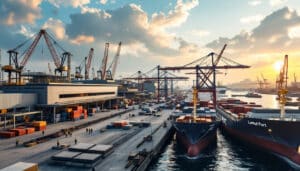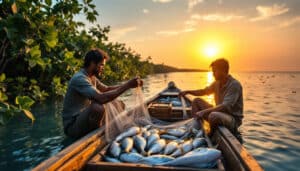The fight against the smuggling of maritime goods is taking on a new dimension in Thailand with the recent interception of a cargo seized by the fisheries department. In a daring operation in the Ranong area, officers intercepted a foreign fishing vessel attempting to smuggle shells with an estimated value of more than 200,000 baht in the Thai market. This action follows a strengthened commitment by Thai authorities to protect maritime resources and promote sustainable fishing practices. The ship, flying the Burmese flag, was spotted in the process of loading shells illegally harvested from Myanmar, intended for sale on Thai soil and for redistribution to other markets. The rapid and effective response of the surveillance teams reflects not only a desire to fight illegal fishing, but also a desire to preserve the marine ecosystem while ensuring that established regulations are respected.
Recently, a coup by Thai authorities has highlighted the challenges of maritime resource smuggling. In a joint operation under the aegis of Department of Fisheries, a significant seizure of shells was carried out, illustrating the country’s continued efforts to combat illicit activities that harm its precious maritime resources. This operation led to the confiscation of goods worth more than 200,000 baht, raising key questions about the economic and environmental impact as well as the regulation of fishing in Thailand.
Table of Contents
ToggleContext and challenges of shellfish smuggling
The smuggling of shells and other maritime resources is a major problem in many coastal regions of the world, including Thailand. According to a recent study, economic losses due to illegal fishing could reach several billion dollars per year globally. Looking at data specific to the Southeast Asian region, we see an increase in cases of shell smuggling, often controlled by criminal networks that exploit loopholes in national laws and lack compliance with standards environmental.
THE shells in question include varied species, often threatened, which play a crucial role in the balance of marine ecosystems. Their illegal collection not only depletes stocks, but also disrupts the marine food chain. This highlights the need for international cooperation and innovative avenues to better monitor and regulate fishing.
Procedures implemented during the anti-smuggling operation
The operation carried out by the Department of Fisheries of Thailand was marked by precise planning and rigorous implementation. A group of experts, led by Banchao Sukkaeo, coordinated the efforts of different fisheries protection and suppression units. The interception took place near the coast of Ranong in the Andaman Sea, an area notorious for illegal fishing practices. During a patrol, authorities identified a Malaysian ship carrying a contingent of shells harvested on the coast of Myanmar, for illegal distribution on the Thai market.
The fact that the boat managed to flee during the interception is a reminder that criminal networks are constantly finding ways to circumvent the law. However, the seizure of 90 bags, totaling approximately 4,050 kilograms, as well as a fishing boat, represents a significant effort to deter illicit entrepreneurs. These actions were made possible thanks to the legislation in force, in particular the Fisheries Act of 2015 and its amendment of 2017, which strengthen measures against illegal fishing.
Implications and future recommendations
The seizure made during this operation serves as an example to other nations of the benefits of rigorous application of the law. It is essential that other countries follow Thailand’s model to combat drug smuggling. shells and marine products. First of all, awareness campaigns should be considered to inform the public and fishermen about the negative consequences of illegal fishing. Such an initiative could help build public consensus against such practices.
Furthermore, authorities should ensure that adequate resources are allocated to maritime surveillance to effectively counter smuggling activities. This could include the use of modern technologies, such as drones or satellite detection systems, which are increasingly accessible and can provide innovative solutions on the ground.
Finally, it is crucial that partnerships are established between the nations of the region. Regional initiatives to combat illegal fishing could take the form of technology exchange programs, training for law enforcement personnel, and the creation of common databases for tracking maritime catches. Such collaborative efforts will strengthen each country’s capacity to address smuggling and preserve maritime resources in the long term.

What role do local police play in preventing illegal fishing in Thailand?
Local police enforce laws, conduct operations and work with government agencies to effectively deter illegal fishing activities.
Why is Thailand’s shellfish smuggling ban significant for global food security?
Thailand’s fight against smuggling helps maintain sustainable fish stocks crucial to the international food supply while promoting legal and ethical fishing practices.









